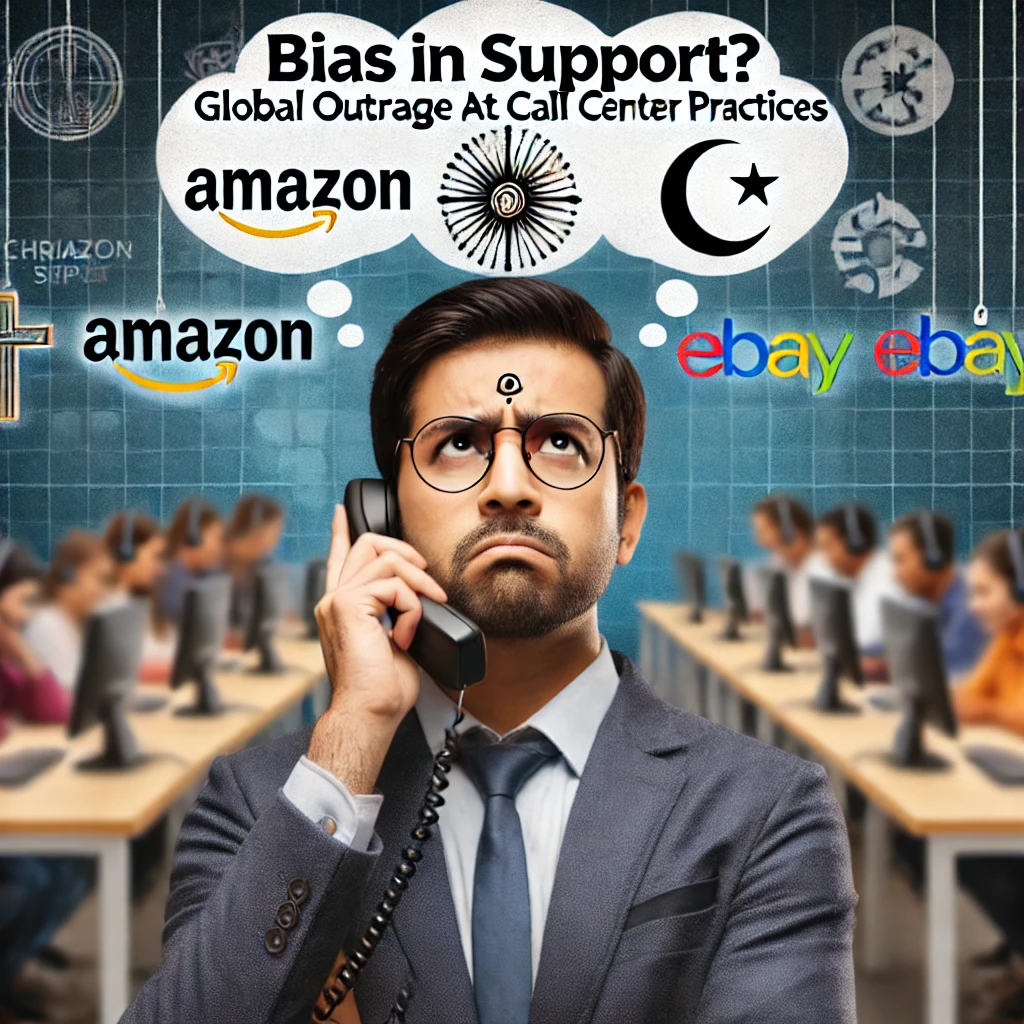Concerns Raised Over Customer Support Bias in Indian Call Centers
Global customer complaints mount against major tech and retail giants
London: Recent allegations have surfaced accusing customer support teams of several multinational companies, including Amazon cloud, eBay, and Oracle cloud, BristishGas, EDF of delivering unsatisfactory service. Critics have specifically pointed to call centers based in India call center, claiming that cultural and religious biases may be affecting the quality of customer interactions.
Nature of Complaints
Numerous customers from diverse backgrounds have reported feeling mistreated or judged during their interactions with certain call center representatives. Specific accusations suggest that customers are being subjected to varying levels of service based on their names or perceived religious affiliations. This is particularly concerning in a global context, where inclusivity and fairness are fundamental to business ethics.
Reported Issues
-
- Bias in Communication: Some customers allege that call center representatives have exhibited dismissive or hostile attitudes based on their names, which often reveal religious or cultural identities.
-
- Judgmental Behavior: Reports indicate that certain individuals may be using personal beliefs to influence their professional conduct, leading to poor customer support experiences.
-
- Generalized Poor Service: Many customers feel that support agents are not adequately trained or motivated to address queries, resulting in unresolved issues and dissatisfaction.
Company Responses
Amazon, eBay, and Oracle,British Gas, EDF, have yet to release official statements addressing these allegations. However, the claims have raised questions about the oversight and training practices within outsourced customer support operations.
Call Center Culture in Focus
India’s call center industry has long been a hub for global customer service due to its cost-effectiveness and a large English-speaking workforce. However, the diversity within India, coupled with historical and cultural sensitivities, can sometimes translate into unconscious bias.
According to industry experts, the key lies in thorough training programs that emphasize neutrality and professionalism. “Customer service should be about problem-solving, not personal judgment,” says Ayen Mariyum, a human resources consultant specializing in customer relations.
Customer Experiences
Several customers have shared their experiences on social media, amplifying the issue. One user wrote: “I couldn’t believe how I was spoken to just because of my name. It felt so unprofessional and hurtful.” Another customer claimed that the representative’s tone changed entirely after they introduced themselves.
-
Rude and Dismissive Interactions: Customers frequently report instances of representatives being impatient, dismissive, or outright rude. Some have mentioned being hung up on mid-conversation or having their chat sessions abruptly closed without resolution. One customer shared: “I’ve never felt so belittled during a support call. The agent kept interrupting me and then disconnected without solving my issue.”
-
Bias Based on Names or Backgrounds: Several individuals have highlighted the impact of perceived cultural or religious bias. A UK-based customer remarked, “As soon as I mentioned my name as religious he is Muslim, the tone of the conversation changed. It was clear the agent had preconceived notions about me.” This pattern has led to a growing perception that some representatives may lack the cultural sensitivity needed for global customer support.
-
Repeated Transfers and Unresolved Issues: Customers often face endless transfers between departments, with each agent asking for the same information. This lack of continuity frustrates users who expect seamless and efficient support. One US customer stated, “I spent over an hour on the phone, got transferred five times, and still didn’t get my issue resolved.”
-
Language and Communication Barriers: Although India has a large English-speaking workforce, differences in accents and communication styles can sometimes create misunderstandings. Customers have voiced concerns about agents not fully comprehending their issues, leading to incorrect or inadequate solutions.
-
Standardized, Unempathetic Responses: Many customers feel they’re being read generic scripts rather than receiving personalized help. One customer noted, “It felt like the agent was a robot. They didn’t even acknowledge the specifics of my problem.”
What Can Be Done?
Experts suggest that companies operating at a global scale must:
-
- Audit Customer Support Processes: Ensure that interactions meet high ethical standards.
-
- Invest in Diversity Training: Train representatives to handle customers impartially.
-
- Provide Feedback Channels: Allow customers to report instances of bias directly to senior management.
Why Agents Rely on Systems
-
Efficiency: Automated systems allow agents to handle repetitive or routine tasks quickly, freeing them to focus on more complex problems.
-
Guided Solutions: Most support agents use system-generated suggestions or workflows because they are designed to standardize issue resolution and reduce errors.
-
Knowledge Gaps: Not all agents are experts in the backend or technical functioning of the system. They rely on the same tools provided to customers, which can be frustrating if the system doesn’t address the root issue.
As more voices join the conversation, it becomes evident that customer satisfaction hinges on equitable treatment and professionalism, regardless of the call center’s location or cultural context. Companies that fail to address these allegations risk long-term damage to their reputations and customer loyalty.
